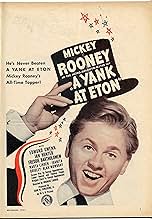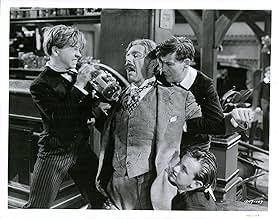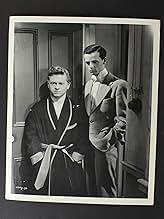During World War II, an American boy named Timothy Dennis is unwillingly sent to Eton College in the UK where he is frequently confused by the many differences between the two cultures.During World War II, an American boy named Timothy Dennis is unwillingly sent to Eton College in the UK where he is frequently confused by the many differences between the two cultures.During World War II, an American boy named Timothy Dennis is unwillingly sent to Eton College in the UK where he is frequently confused by the many differences between the two cultures.
- Boy in Locker Room
- (uncredited)
- Eton Student
- (uncredited)
- Cabby
- (uncredited)
- Man on the Street
- (uncredited)
- Waiter at the Willow Club
- (uncredited)
- Student
- (uncredited)
- Coach
- (uncredited)
- Tour Guide
- (uncredited)
- Eton Student
- (uncredited)
Featured reviews
The stories come from basically the same formula, as well. Both involve boys who are put into a new location, both feel they are better than the others around them, both are shunned by their peers, only to win them over in the final reel. Both are also extremely predictable.
This film (the better of the two), will appeal to Rooney fans, and is a decent way to spend an hour and a half. Not a classic.
6 out of 10
Where the collegiate-level Oxford film also had a romantic aspect, this film has more of the school and house structure and its politics. From what I have read, MGM apparently made this film as a sort of compatriot propaganda film. American forces were descending on England to build up for the Allied assault of Germany. So, this film portrayed the friendly relations between the English and Americans. Of course, the war in Europe was raging at the time. The U. K. had survived the German bombings in 1941. So, it is strange that this film doesn't even have a hint of the war going on.
The Oxford film of 1938 was made in England. It was the first one out of MGM's newly established English studio. But, this film was made entirely in Hollywood. The entire cast gave very good performaces. Mickey Rooney gave a believable performance as a talented athlete. He's a young American, Timothy Dennis, who longed to play football at Notre Dame, but finds himself in a prep school in England after his widowed mother marries a prominent Englishman. So, the story isn't about Mickey Rooney, the very short actor. And the scenes of his sports on the field, and his racing are well acted and filmed. If there is a fault here, it's in portraying Ronnie Kenvil in the steeplechase as being so hesitant and fatigued.
Edmund Gwenn is the one key cast member who played a similar role as a school master in this film, to the one he had in the 1938 film. And, of course, this is one of Peter Lawford's very early films - just his sixth. Except for his quite distinct voice, I wouldn't have recognized the youthful 18-year-old Lawford who plays Ronnie Kenvil. Other familiar actors of note in this film are Ian Hunter, Alan Mowbray and Freddie Bartholomew.
"Yank at Oxford" had been a big hit at the box office in 1938 - finishing 29th for the year in ticket sales. This film wasn't as big a hit (well, it didn't have Robert Taylor and Vivien Leigh) but was a success and finished the year 60th in box office receipts, It didn't pass the earlier film, but it also had much greater competition with films of all types, including war-related. This was the year of such all-time classics as "Casablanca" and "Mrs. Miniver," and a host of fine musicals, dramas, comedies and other war-related stories.
This is an enjoyable film that reflects something of the time and higher end of English culture of the day. It's a good family film and one most people should still be able to enjoy well into the 21st century.
Mickey Rooney, MGM's human dynamo, is in all his glory in this pleasant film obviously fashioned to his particular talents. Although a mite old to be playing a high school boy (he turned 22 in 1942), Rooney pulls out all the stops, and shows considerable athletic ability, as an American kid who's angry about having to attend Eton, rather than his beloved Notre Dame. It's hard to fault all of his behavior today, as some of the conventions he rebels against, especially the physical brutality inflicted upon the lower boys at Eton, needed to be changed.
However, the film's purpose is not to deliver a social message. It's aim was to provide a money maker for MGM, as well as a salute to our British allies. The Second World War and our common enemies are never mentioned, but the affectionate comradeship between our two nations is certainly underlined.
Mickey is given excellent support from a fine cast of costars. Puckish Edmund Gwenn plays Rooney's house master, his whimsicality marred somewhat by his casual allowance of the older boys beating of the younger. Earnest Ian Hunter gives a thoughtful performance as Mickey's new English stepfather. Gangling Freddie Bartholomew plays Hunter's well-bred son; this tall, skinny youth bares scant resemblance to the small boy who charmed audiences in David COPPERFIELD and CAPTAINS COURAGEOUS back in the 1930's.
Marta Linden & Juanita Quigley appear as Mickey's supportive Mom and badly behaved younger sister. Little Raymond Severn plays a tiny earl who becomes Rooney's best pal at school. Peter Lawford is convincingly nasty as a bullying upper boy. Genial Alan Mowbray enlivens his brief appearance as a befuddled old Etonian trying to remember a particular steeplechase race from decades past.
Movie mavens will recognize several uncredited performers: Minna Phillips as a slightly silly Eton school matron; Billy Bevan as a tour guide; former child star Terry Kilburn as one of Bartholomew's student friends; cheery Aubrey Mather as a butler who learns an important bit of American vernacular; and Alan Napier as a restaurant club owner with a profound dislike for Eton boys in his establishment.
********************
The song sung over the opening credits is the first verse of the famous Eton Boating Song (1863, William Johnson & Capt. Algernon Drummond); the second verse is heard later on in the film. The words are as follows:
Jolly boating weather, And a hay harvest breeze, Blade on the feather, Shade off the trees, Let us swing, swing together, With your bodies between your knees, Swing, swing together, With your bodies between your knees.
Skirting past the rushes, Ruffling o'er the weeds, Where the lock stream gushes, Where the cygnet feeds, Let us see how the wine-glass flushes At Supper on Boveney meads, Let us see how the wine-glass flushes At Supper on Boveney meads.
Interestingly, those are American, not British, voices singing. And the film never shows Rooney or the other boys doing any boating whatsoever.
Eton College, the largest of England's great public (independent secondary) schools, was founded by Henry VI in 1440-1441, and is located across the River Thames from Windsor Castle. Its student body is made up of over a thousand Oppidans, generally drawn from Britain's wealthiest or aristocratic families and who live in boardinghouses under the care of house masters; and the King's Scholars, of which 70 are named each year by means of a special examination, who dwell in elite quarters. Generally, lads attend Eton from age 13 until they are ready to enter university.
After the death of her husband, Marta Linden takes a trip to Europe and returns with a new husband in Ian Hunter to the distress of her children, Rooney and Juanita Quigley. She says they're moving to England and Rooney doesn't like the idea because he wants to play football for Notre Dame.
Hunter gets the Mick into his old alma mater Eton and Rooney takes to it much like his character of Whitey Marsh took to Boystown. But the Mick's got a heart of gold which soon comes out. If you have seen Boys Town and remember the plot situations that's roughly what happens here.
There were some criticisms of A Yank At Eton one of which was the mistake of showing folks using left hand drive in cars instead of right hand which is what they have in the UK. Most of the time the negative was just reversed like they did for Gary Cooper to show a left handed batting Lou Gehrig in Pride Of The Yankees. In crowd scenes that couldn't be helped and unlike A Yank At Oxford, this film was done on the MGM back lot.
However having Rooney as a track star was a bit much. Face it folks, Mickey's size and short legs would never have made him any kind of star in running. And here they have Mickey doing hurdles and doing it in street shoes. Track coaches around the world probably laughed their heads off.
Although this was a wartime film with the obligatory reminder to buy bonds at the end of the film, there's not a mention of war or impending war in the film. Just a reminder of how Eton trains some of the future leaders in Great Britain who have never let the country down in peril. They might well have quoted the Duke of Wellington's aphorism of how the Battle Of Waterloo was won on the playing fields of Eton.
It's not Boystown, but A Yank At Eton is an entertaining film if one can overlook some flaws. They should have had Mickey stick to football, he would have been interesting playing rugby in the climax.
Did you know
- TriviaEarly in the movie, Little Lord Fauntleroy is mentioned. Both Mickey Rooney and Freddie Bartholomew had starred in the 1936 movie version (Le petit Lord Fauntleroy (1936)) of the Frances Hodgson Burnett novel.
- GoofsWhen Timothy meets Flossie while running errands, the cars are driving on the right side of the street. Cars drive on the left in England.
- Quotes
Flossie Sampson: [Overly dramatic] When you've crossed as many times as I have you realize how unimportant a shipboard romance really is. It's just one of those ephemeral things.
Timothy Dennis: Well, it's all in how you look at it. To me it's not one of those ... one of those whatchamacallit things.
- ConnectionsReferenced in Family Ties Vacation (1985)
- SoundtracksThe Eton Boating Song
(1863) (uncredited)
Music by Algernon Drummond
Lyrics by William Johnson
Sung by a chorus during the opening credits
Sung often by Eton students
Played often as background music
Details
- Runtime
- 1h 28m(88 min)
- Color
- Aspect ratio
- 1.37 : 1





































